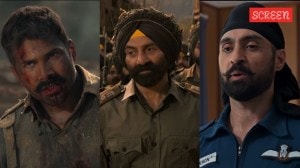Meeting the Taalyogi
Pandit Suresh Talwalkar,who was recently awarded with the Padma Shri,talks about his six-decade-long association with music
Pandit Suresh Talwalkar,who was recently awarded with the Padma Shri,talks about his six-decade-long association with music
A sense of deja vu has overpowered Pandit Suresh Talwalkar,who was recently honoured with a Padma Shri. The award takes him back to 2001,when Shankaracharya conferred him the title of Taalyogi. There was excitement,but it was short-lived. As the day for receiving the award drew closer,a strange anxiety surfaced in Talwalkars mind. I kept thinking whether I would be able to live up to the title. Then on,I became all the more serious about my profession, says the accomplished tabla player. This time again,the call to responsibility is pressing.
An award brings happiness but it also brings a responsibility. One needs to strive to live up to the expectations of people and the society. Nevertheless,for me,my music is my sadhana (devotion). Awards and recognitions are its by-products, says Talwalkar,adding that although he has high regard for the Padma Shri,the regional awards are dearer to him. National honours are very formal. Most recipients dont even know the works of fellow recipients. At a regional level,people who are conferring me with the award know my work, he says.
Talwalkar does not remember exactly when he got drawn towards the percussion instrument. There are faint memories of giving thekas (beats) on the tabla. I must have been four or five then, recalls the 65-year-old. What he does remember clearly is that his father,Dattatrey Talwalkar,a keertankar,was his source of inspiration. He was not a learned musician but he played pakhawaj beautifully and accompanied his uncle for various performances, he says.
At the age of eight,Talwalkar began his formal tabla training under Pandit Pandharinath Nageshkar and continued learning from him for six years. Then he became a student of Mridangacharya Pandit Ramnad Ishwaran,who taught him the minutae of Carnatic layashastra (rhythm theory). From Pandit Gajananbuva Joshi and Pandit Nivruttibuva Sarnaik the gurus he accompanied the most Talwalkar got deep insight into ragas,taals,bandishes,gharanas and the shaili.
Despite gathering a wide gamut of knowledge about music,the tabla remains closest to his heart. Through the tabla,I have seen the entire world of music, says Talwalkar,whose students include well-known names such as Vijay Ghate,Ramdas Palsule,Charudatta Phadke and his son Satyajit Talwalkar,who received Sangeet Natak Akadami Yuva Puraskar this year.
The master would keenly observe and learn from renowned musicians such as Pandit Bhimsen Joshi,Pandit Ram Marathe,Ustad Vilayat Khan,Pandit Krishnarao Shankar Pandit and Pandit Gajanan Joshi,whom he accompanied during various concerts. When I performed with them,I forgot myself and concentrated on learning their music, says Talwalkar,who has been performing with Pandit Ulhas Kashalkar,a celebrated Hindustani classical vocalist,for 35 years.
Among the ideals that the musician holds dear is the guru-shishya parampara. The institute,Taalyogi Ashram,a gurukul where he trains students in vocals and instruments such as tabla,pakhawaj,jhembe and even western drums,is also based on the tradition. One can be gifted with sur from birth. But for bandishes,ragas,taals and other elements of music,you need a guru, says Talwalkar.
But he is not dismissive of the younger generation. Rubbishing the misconception that the new generation is going away from Indian classical music,he points out that the participation of young viewers for classical music concerts has,in fact,been increasing. Sangeet is ever-changing. However,newness should not leave behind the original culture. For instance,despite being from the Kirana gharana,Pandit Bhimsen Joshi developed his own style. So while gharana is a constant; shaili is variable, he explains.
For the last few years,the maestro is busy writing a book that deals with the micro and macro faces of Indian classical music covering subjects such as sur,laya,taal,raga,guru-shishya parampara and so on. It also includes a compilation of my music lectures and videos. The book will be completed in another four months but I am yet to give it a title, he says.







